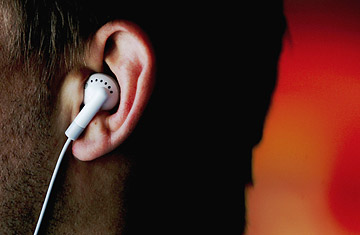How Bad Are iPods for Your Hearing?
Hearing loss is more common than ever before. About 16% of American adults have an impaired ability to hear speech, and more than 30% of Americans over age 20 — an estimated 55 million people — have lost some high-frequency hearing, according to a new study published Monday in the Archives of Internal Medicine. The finding has got experts — and concerned parents — wondering anew: Does listening to loud music through headphones lead to long-term hearing loss? Brian Fligor, director of diagnostic audiology at Children's Hospital Boston, explains how much damage your headphone habit might cause — and how to mitigate your risk.
在現在的社會,聽力喪失越來越普遍了。《內科醫學文獻》周一發表的一份調查研究顯示,約16%的美國成年人對日常對話的聽力削弱了,近30%的20周歲以上的年輕人,人數大約在55,000,000,已經喪失了對部分高頻率聲音的聽覺。這項發現重新引起了相關人士及專家的擔心:長時間通過耳機聽大音量的音樂是否會導致人的聽力喪失?來自波士頓兒童醫院的聽力學診斷教授,Brian Fligor解釋了耳機聽音樂的習慣會給你造成多大的影響,以及如何減輕聽力喪失的風險。
Q: How much hearing loss does an iPod cause?
A: It depends on the person, it depends on how long you're listening, and it depends on the level at which you're setting your iPod.

Q:iPod在多大程度上導致了聽力喪失?
??
A:那取決于個人,取決于你每次聽音樂多長時間,以及你在iPod上設置的音量水平。
If you're using the earbuds that come with an iPod and you turn the volume up to about 90% of maximum and you listen a total of two hours a day, five days a week, our best estimates are that the people who have more sensitive ears will develop a rather significant degree of hearing loss — on the order of 40 decibels (dB). That means the quietest sounds audible are 40 dB loud. Now, this is high-pitched hearing loss, so a person can still hear sounds and understand most speech. The impact is going to be most clearly noted when the background-noise level goes up, when you have to focus on what someone is saying. Then it can really start to impair your ability to communicate.
如果你戴著耳機聽iPod,并且將音量設置在90%或以上,每天大約聽2小時,一個禮拜有五天,天天如此,我們最好的估計是,誰擁有更敏感的耳朵,誰的聽力喪失的程度就更大-以40分貝為準。這意味著最安靜的時候, 你能聽到40分貝的聲音。這是一種對高聲調的聲音聽力喪失,所以她/他仍可以聽清楚并且明白大多數的日常對話。這種聽力喪失的影響在背景噪音水平上升時表現的最明顯,此時你不得不集中注意力才能聽清楚某人的講話。然后,它開始削弱你的社交能力。
This would happen only after about 10 years or so or even more of listening to a personal audio device. One patient I had used his headphones instead of earplugs when he was on his construction job. He thought as long as he could hear his music over the sound of his saws, he was protecting his ears — because he liked the sound of his music but didn't like the sound of the construction noise. He had a good 50 dB to 55 dB of noise-induced hearing loss at 28 years old. We asked a few pointed questions about when he was having difficulty understanding people, and his response was classic. "When I'm sitting at home with the TV off, I can understand just fine," he said, "but when I go out for dinner, I have trouble."
這種情況只會發生在用隨身聽聽音樂10年或者10年以后。我曾經遇到過這樣一個病人,他是建筑行業的,當他工作的時候總是戴著耳塞聽音樂,他認為只要他聽的是音樂聲,而不是電鋸的噪音,就可以保護他的耳朵——因為他喜歡的是音樂而不是建筑施工時的噪音。在28歲的時候,他已經因噪音誘發了50~55分貝的聽力喪失。我們問了一些關鍵性的問題,關于他在與人交流過程中遇到的困難,他給了一個典型的回答,“當我坐在家里,電視機沒有打開的情況下,我可以很好的明白人們的交談。”他說道,“但是當我去趕赴宴會時,我就會有很大的麻煩。”
There is huge variation in how people are affected by loud sound, however, and this is an area where a number of researchers are conducting studies. Certainly a huge part of this is underlying genetics. We know how much sound causes how much hearing loss based on studies that were conducted in the late '60s and early '70s, before employers were required to protect workers' hearing in noisy work environments. What was found is that when people are exposed to a certain level of noise every day for a certain duration, they're going to have a certain degree of hearing loss on average. But the amount of hearing loss might differ by as much as 30 dB between people who had the toughest ears and those with the most tender ones — a huge variation. Unfortunately, we don't know who has the tougher ears and who has the tender ones until after they've lost their hearing. So, as a clinician, I have to treat everyone as if they had tender ears.
這巨大的變化體現了噪音對人的影響有多大,然而,同時這是一個許多研究者正在努力的方向。當然,這里有很大一部分是屬于遺傳學的。我們得知的多大程度的聲音導致多大程度的聽力喪失,是基于六十年代末和七十年代初,雇主尚未被要求在喧囂的工作環境中保護工人的聽力的情況下的研究。我們發現,當人們長期的暴露在某一特定噪音水平環境中,他們平均都會有一定程度的聽力喪失。但是,人與人之間聽力喪失的程度不同,那些耳朵比較強健的人與耳朵與較柔嫩的人相比,差異可達30分貝。不幸的是,我們直到那些人失去了聽力,也還不知道他們誰的耳朵比較強健,誰的比較柔嫩。那么,作為一個臨床醫師,我必須認真地對待每個人,將他們的耳朵都當做是柔嫩的。











